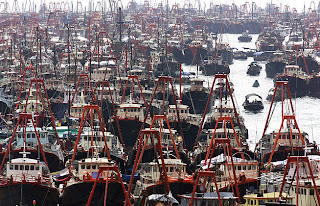 |
| Photo: thefisheriesblog.blogspot.com |
Entire species of marine life will never be seen in the Anthropocene (the Age of Man), let alone tasted, if we do not curb our insatiable voracity for fish. Last year, global fish consumption hit a record high of 17 kg (37 pounds) per person per year, even though global fish stocks have continued to decline. On average, people eat four times as much fish now than they did in 1950.
Around 85% of global fish stocks are over-exploited, depleted, fully exploited or in recovery from exploitation. Only this week, a report suggested there may be fewer than 100 cod over the age of 13 years in the North Sea between the United Kingdom and Scandinavia. It’s a worrying sign that we are losing fish old enough to create offspring that replenish populations.
Large areas of seabed in the Mediterranean and North Sea now resemble a desert – the seas have been expunged of fish using increasingly efficient methods such as bottom trawling. And now, these heavily subsidised industrial fleets are cleaning up tropical oceans too. One-quarter of the EU catch is now made outside European waters, much of it in previously rich West African seas, where each trawler can scoop up hundreds of thousands of kilos of fish in a day. All West African fisheries are now over-exploited, coastal fisheries have declined 50% in the past 30 years, according to the UN Food and Agriculture Organisation.
Catches in the tropics are expected to decline a further 40% by 2050, and yet some 400 million people in Africa and Southeast Asia rely on fish caught (mainly through artisanal fishing) to provide their protein and minerals. With climate change expected to impact agricultural production, people are going to rely more than ever on fish for their nutritional needs.
The policy of subsidising vast fishing fleets to catch ever-diminishing stocks is unsustainable. In Spain, for example, one in three fish landed is paid for by subsidy. Governments, concerned with keeping jobs alive in the fishing industry in the short-term, are essentially paying people to extinguish their own long-term job prospects – not to mention the effect on the next generation of fishermen. Artisanal fishing catches half the world’s fish, yet it provides 90% of the sector’s jobs.
Protect depletion
Clearly, industrialised countries are not about to return to traditional methods. However, the disastrous management of the industry needs to be reformed if we are to restore fisheries to a sustainable level. In the EU alone, restoring stocks would result in greater catches of an estimated 3.5 tonnes, worth... Read full story
Also see:
Overfishing: Plenty of sea? Not always - National Geographic - Ocean overfishing is simply the taking of wildlife from the sea at rates too high for fished species to replace themselves. The earliest overfishing occurred in the early 1800s when humans, seeking blubber for lamp oil, decimated the whale population. Some fish that we eat, including Atlantic cod and herring and California's sardines, were also harvested to the brink of extinction by the mid-1900s...
Saving our Oceans: Code Blue - Time Magazine - One woman's dream to create national parks in the sea. The Sargasso Sea has no shores. The 2 million-sq.-mi. body of water in the middle of the Atlantic is defined by two features: the ocean currents forming the North Atlantic subtropical gyre, which cycles around the sea, and sargassum, the free-floating golden-brown seaweed...










